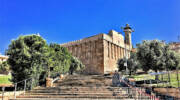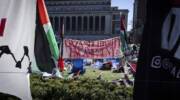Moses was careful not to directly insult the people for their sins.
By Rabbi Ari Enkin, Rabbinic Director, United with Israel
The sad holiday of Tisha B’av, where we mourn the destruction of the two Holy Temples that once stood in Jerusalem is always observed after the opening Torah portion in the book of Deuteronomy is read in synagogue on the Shabbat beforehand.
Our sages arranged this so that we would be exposed to Moses’ final words, his “last will and testament” if you will, before commemorating the destruction of the Temples. Let’s see some of his last words and their connection to Tisha B’av.
It is noted that Moses reminds the Jewish people of their journey through the cities of “Toffel” and “Di Zahav.” The problem, however, is that no such places exist! At least not by those names!
As such, the commentators explain that these were not literal places. Rather, they were codes to convey some type of message or memory from their various encampments. For example, one place name, “Di Zahav,” (“the place with the gold”), reminds the people of the sin of the Golden Calf, and another reminds them of the sin of the spies, and so on.
The question is asked: If the whole point of Moses’s speech was to rebuke the Jewish people, why did he do it in such a roundabout way? Why wasn’t he more direct and explicit?
It is explained that Moses was being careful not to directly insult the people for their sins. This is to teach us that even sinners deserve some measure of respect.
Kamtza and Bar Kamtza
Related to this is the famous Tisha B’av story of Kamtza and Bar Kamtza.
The story goes something like this: There was a man who was having a big party, and he instructed his servant to invite his friend “Kamtza.”
But the servant made a big mistake and invited his master’s arch-enemy “Bar Kamtza” instead. When the master arrived at his party and saw Bar Kamtza sitting there, he expelled him from the party in a very harsh and embarrassing manner.
Bar Kamtza was furious, to say the least, especially considering that there were many rabbis who were present who could have intervened and chose not to. So Bar Kamtza took revenge by bad-mouthing the rabbis and the Jewish people to Roman authorities.
Not only did this lead to the destruction of the Temple, we are told that God actually assisted Bar Kamtza to be successful in his revenge mission!
The lesson here is similar. Playing with people’s feelings is like playing with fire.
You can have the best intentions, but if you mess up – you can burn down the entire house. One who goes into a chemistry lab, trying to have some fun and combines dangerous ingredients might end up blowing the place up. That’s just how it works. Bar Kamtza had to be appeased. Even God felt so.
The story of Kamtza and Bar Kamtza is the focus of all Tisha B’av literature and discussions. It is an example of the senseless hatred that existed between Jews during that time.
Many Jews nowadays feel like they don’t fit in. People feel that they are judged because they don’t go to the “right” synagogue, or school, or club. They feel that they are looked down upon, perhaps because they are not observant enough as others.
Don’t hate anyone for “sinning differently” than you. Moses cared about the feelings of the Jewish people and God cared about the feelings of Bar Kamtza. And we need to care about the feelings of people who feel embarrassed or excluded.
So the next time you see someone who is clearly in the wrong (well, at least in your opinion), relax. Don’t go bonkers on him or her. He is just sinning a little differently than you. That’s all.
His feelings are still important.
MAKE THE LAND OF ISRAEL EVEN MORE BEAUTIFUL!
PLANT YOUR VERY OWN FRUIT TREES IN ISRAEL!
Farmers near the Gaza border lost family, friends and workers. Spring is here, and they desperately need help to replant the farms. Join us in blessing the People and Land of Israel.
“I will ordain My blessing for you…” (Leviticus 25:4)























